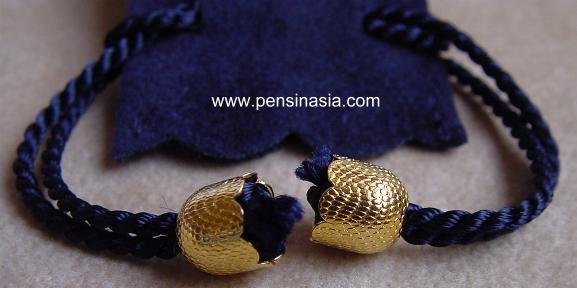(Please
note that the red flame colour in the photo looks "smear". This is
because of the compression of the high resolution photograph. In the
process, the red colour looks "smeared" and "distorted".
This is usually the case for red colour. Let me assure you that the red
colour is perfect, no distortion and it is evenly lacquered throughout the
barrel and cap ). In
other words, it is PERFECT.

The
Lady Pen
Whether
a gift from a loved one or a purchase for personal use, you will be
delighted that you have a Lady pen in your hands. One will appreciate the
pleasure of using it as the craftsmanship and care that went into designing
it. Like all objects made by S.T. Dupont, the Lady pen will be a faithful
companion whose perfect blend of beauty and performance, simplicity and
elegance, quality and comfort, will give the pleasure of owning it day after
day.

S.T.
DUPONT and Chinese Lacquer
S.T.
Dupont product of distinction of the several and various noble substances
which were used to make it, there is one that is especially precious and
dear to our heart : Chinese Lacquer. Let me share the fascination for this
mysterious substance. Here a
few words about its origins and the craft of the
master-lacquerers…………………………
Authentic
Chinese lacquer so silky to the touch and with the sheen of a pearl, gives
each item its appearance of rare worth often copied but never equaled.
To
underline this unique characteristic, this authenticity, each S.T. Dupont
object made with Chinese lacquer receives a " Chinese lacquer "
hallmark as well as a logo representing a stylised leaf of the Rhus
Vernicifera : the lacquer tree.

The
Art of Lacquer
The
first use of lacquer is lost in the mists of time. However, in the second
Millennium BC, there was mention of a painted lacquered screen and a sort of
tambourin which dated from the time of the Emperor Yu.
Whether
the lacquer was painted, inlaid sculpted (Tiao Tsi) gold embossed (Ts'iang
Kin), engraved, inlaid eggshell or mother of pearl, Coromandel or Ke-Hui,
the variety of techniques used in the Orient was infinite, and the only
thing the craftsmen had in common was the sap they used.
The art
of lacquering reached its peak in China in the XVII century under the Ming
Dynasty, and its influence extended as far as Europe. But although the
technique was undoubtedly invented in China, it was the Japanese, initiated
by Chinese artists who developed the technique of lacquer to its most
perfect level.

Lacquer
The
resinous sap of Rhus Vernicifera is collected during five months in small
bamboo buckets. When it comes into contact with the air it darkens slightly
and takes on the consistency of Latex. Conserved in a humid dust free
atmosphere, it separates into different layers of which the best, the top
one (" Son-mal-giau " in Chinese), will be used for the final
coating of lacquer.
At this
stage the preparation of the lacquer begins. The craftsmen are extremely
discreet about which additives they use whether it is Tong Yeau oil, iron
sulphate or rice vinegar. The mystery is even deeper when it comes to
colouring.
A host
of ingredients is used: wood oils and all sorts of cinnabarite powders whose
names evoke the art of the apothecary or the alchemist.


S.T.
Dupont Master-Lacquer
S.T.
Dupont master lacquerers have studied with passion and forebearance the art
of lacquer. Over the years they have tamed the sap of the lacquer tree
rediscovering the ancient techniques of their Chinese and Japanese
predecessors.
All
objects in Chinese lacquer from S.T. Dupont's lacquer workshops in Faverges
are "dressed" in this fascinating substance. Only true lacquer
gives surfaces this mystical transparence, this strange depth that no
synthetic varnish can achieve.
Past
master in the art of single colour lacquers spaces of perfect calm from
mirror-polished black to deep midnight blue S.T. Dupont has, through
painstaking research, discovered and harnessed the secrets of those
notoriously difficult lacquers tortoiseshell coral and gold dust….


High
Quality Chinese Lacquer Pen
Its
qualities hardness and brilliance make Chinese lacquer ideal for use as a
decorative and protective coating.
Unusual
resistance: once completely dried Chinese lacquer is virtually
impervious to attack even from acid, indeed lacquered items have been
recovered undamaged from the sea bed after lying there several centuries.
Wear
and tear: lacquer is exceptionally hard-wearing and highly resistant
to knocks scuffs and scratches…
Thus
caring for your Chinese lacquer is simplicity itself : clean it as would
spectacle lenses or jewellery by breathing on it and rubbing with a soft
cloth.

Dimensions
Total
length (cap closed) : 114 mm (4.5")
Total
length with cap posted behind the barrel : 138
mm (5.4")
Barrel
diameter: 10
mm (0.4")
